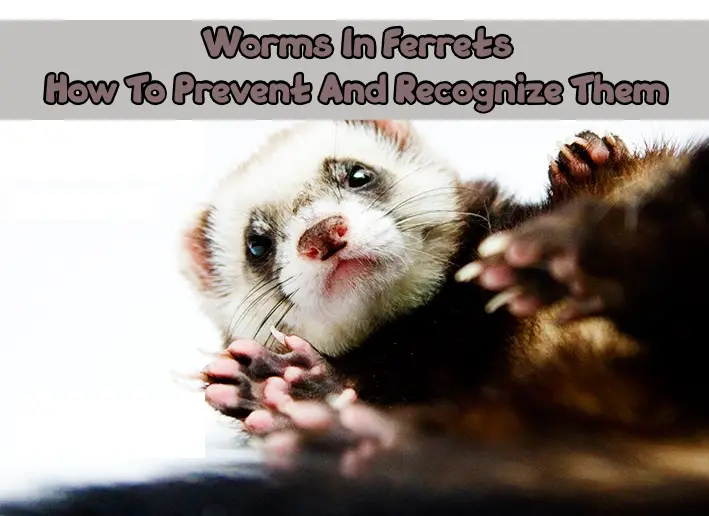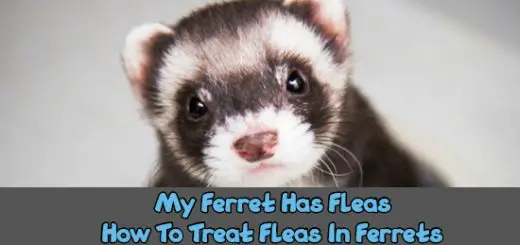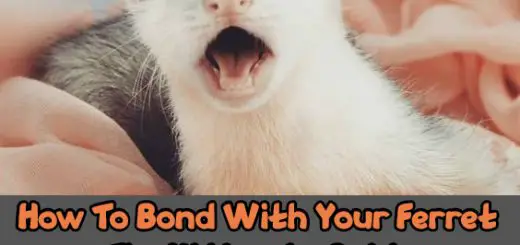Worms In Ferrets – Symptoms, Treatment and Prevention

Worms in ferrets are a health concern for ferrets that go outside or live with other pets. The good news? Most worms are treatable.
Ringworm is a fungal infection that ferrets can contract and it also can be transmitted to people. Roundworms are uncommon in the ferret but the ferret can serve as an intermediate host.
All new ferrets or those in contact with other pets should receive a routine fecal exam to test for parasites.
Ferrets can also get infected heartworms. Heartworms in ferrets are spread by mosquito bites. The mosquito must bite an infected dog and then bite the ferret. This worm can’t be spread from ferret to dogs or other animals.
Page Contents
Worms in Ferrets – Symptoms
If you notice your ferret licking its bottom excessively or dragging it across the floor, then without a doubt you’re dealing with ferret worms. Furthermore, keep an eye out other symptoms for worms in ferrets such as:
- Blemishes of white strings in your ferret’s poop. These are worm eggs
- Dry and thin fur
- Bloating around the middle of the belly
- Extreme weakness or lethargy
- Itchy anus
- Diarrhoea
- Blood in poop
- Increased appetite and weight loss simultaneously
- Stomach pains
- Belly sensitive to touch
It’s important to note that if you can’t see worm eggs either in their poop, or around their anus, then it’s most likely not ferret worms.
Although, the above symptoms are an indication of worms in ferrets, there are different types of worms that you, as an owner need to be aware of. With that said, the main types of worms in ferrets include:
- Tapeworms
- Heartworms
- Ringworms
Tapeworms
A common type of worms in ferrets is the tapeworm. Tapeworms are intestinal parasites that can result from your ferret swallowing a flea carrying tapeworm eggs. Ferrets can contract tapeworms the same as cats and dogs. Your can find worms in ferrets even if your pet is only indoors. This can happen when:
- You have other pets in the house that go outside
- You can bring the disease inside your house
Moreover, once the flea jumps to your ferret’s fur, it can be ingested when grooming or even eating or drinking. Treatment for tapeworms must be undertaken quickly. This involves killing the tapeworms and preventing further flea infestation.
Tapeworms – Symptoms
When your ferret swallows an infected flea, the tapeworm egg will use the body as a host and latch on to the intestinal walls. As the tapeworm grows, it will start to live off the nutrients your ferret gets from the food it eats.
As a result you will start seeing symptoms of worms in ferrets. Those symptoms include:
- Upset stomach
- Diarrhoea
- Throwing up
- Loss of weight
- Swelling around the middle of the belly, also known as “pot belly”
- Red and inflamed skin
- Hair loss
Tapeworms – Treatments
Once you have established that your ferret has tapeworms you must do the following:
- Take your ferret to the vet, so it can be dewormed and given special medication. Most medication over the counter will make your ferret sick
- After your ferret has been dewormed, it will need another deworming after around 10 days
- You must clean everything including your ferret’s cage, bedding, sofas, soft furniture, carpets, etc
- All other pets in the house need to be dewormed. You will also need to take a medication as humans can also get worms
- Run a fine-toothed comb through his fur to check for any live fleas and remove them
Tapeworms – Summary
- Tapeworms are common type of parasites that your ferret can get
- Your ferret won’t get tapeworm from a flea bite. However, they will contract the disease from swallowing an infected flea
- If your ferret has fleas and you are using a comb to remove fleas – always clean the comb after in hot water
- Take your pet to the vet to get special ferret deworming medicine
- Clean your house daily – ferret’s bedding, cage, toilet, carpets and soft furniture
- Choose a flea product that prevents flea bites by killing the flea the moment it gets on your ferret’s fur
- You will need to continue with the treatment of your house in order to prevent any further flea infestation
Heartworms In Ferrets
Another type of worms in ferrets is heartworm. Heartworms are contracted through the bite of an infected mosquito. You ferret is more likely to get heartworms if you live in a place where mosquito population is high.
As the ferret’s heart is small in size, having even only a few heartworms in their body can result in death due to heart failure.
Heartworms – Symptoms
Symptoms of heartworm disease usually starts suddenly and worsens quickly. Common symptoms are the following:
- Continuous cough
- Weakness and fatigue
- Difficulty breathing
- Swollen belly as a result of abnormal fluid retention
In extreme cases your ferret might develop heart failure.
Heartworms – Treatments
Heartworm disease is extremely difficult to diagnose and treatment is not always possible. The focus must be on prevention rather than treatment once already contracted.
For prevention purposes, the medicines Selamectin and Ivermectin are commonly used. Nonetheless, you should contact your vet regarding which medicine is the right option for your ferret and what dosage you should apply.
This medicine come in different forms such as oral liquid, chewable pill, or topical “spot-on”. Regular application of the drug will help prevent your ferret contracting heartworm disease.
Once contracted, heartworms can be treated with the help of:
- Anti-inflammation drugs
- Antibiotics
- Rest
- Fluids
- Treatment to kill the adult heartworm and another treatment to kill the microfilaria which is the heartworm larvae
Heartworms – Summary
In most cases heartworm disease in ferrets is fatal. The reason for that is the disease is almost never detected on time. Surgery is considered the last option as risks are high. As heartworm disease is almost always fatal, you should take your ferret immediately to the vet, so treatment can begin straight away.
What Do Ferret Worms Look Like?

Parasites are common in ferrets. Some of these parasites include tapeworms, heartworms, roundworms, flukes and more. Read below on how to recognise the different types.
- If the worms are white in color and are moving and wriggling a lot, they are most likely fly maggots
- The worms look like rice and not moving or barely moving, they are tapeworms
- If they look like spaghetti or noodle string, they are heartworms or roundworms
- If they look like seeds in the poop, they are most likely fluke eggs
Final Thoughts
In order to determine if you’re dealing with with worms in ferrets, keep an eye out for actual worms in their poop and around their anus aswell as the main symptoms such as:
- Bloating around the middle of the belly
- Extreme weakness or lethargy
- Itchy anus
- Diarrhoea
- Blood in poop
The best course of treatment for all parasites is the preventive method such as using preventive medicine especially for heartworms as contracting this disease can be fatal for your ferret. In addition, clean your house and your ferret’s environment regularly.
For more health problems that ferrets can be affected by, head over here Adrenal Gland Disease In Ferrets: Suprelorin Ferret Implant Cost
Frequently Asked Questions – FAQ
What Are Type Of Ferret Parasites?
Ferrets can contract both internal and external parasites such as worms, coccidia, mites, ticks and fleas.
Read here about fleas in ferrets Fleas In Ferrets – My Ferret Has Fleas – What Should I Do?
What Are The Symptoms Of Coccidia In Ferrets?
The symptoms of the parasite coccidia in ferrets depend on what stage is the parasite at in their life. However, for most ferrets the symptoms include:
- Diarrhea
- Lethargy
- Weight loss
- An upset stomach
- Sometimes rectal prolapse. This can result in secondary infection, ulcers and even more health complications
References
http://www.animosante.ca/ferrets.html
https://www.all-about-ferrets.com/wp-content/uploads/95zoonotic.pdf



